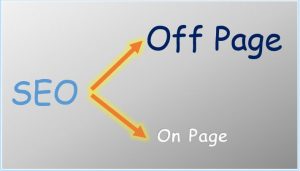Mystified about SEO? Confused about differing opinions? You are not alone – many people are. So it’s time for some plain-talking about this all-important subject, in a way that all of us can understand:
“What is SEO?”
This is THE fundamental misunderstanding. “SEO” does not refer to just one type of activity or approach — SEO, properly speaking, includes a great variety of tactics and techniques.
The basic goal is to transform your website into a resource that will be truly important to your site visitors, as when you are providing exactly what others need the search engines will also place a high valuation on your site as well, which means (all other things being equal) that they are going to be much more likely to “promote” you near or at the top of various searches.
“What Are The Main Components of SEO”

What is involved in SEO? In general, you will need to concentrate on two areas:
- You’ll need to create useful and practical website page content.
- You’ll also need to examine some technical aspects of your site, both on-site elements and other factors (sometimes called off-site factors).
“Why Is ‘Content’ The First Consideration?”
Why do we focus on content before the technical aspects? Because content – what your site visitors will see, read, listen to or watch (in the case of videos) is what will draw people to your site in the first place.
And if the content is top-notch, and in particular, content they can’t find anywhere else, they will be back, and they will tell others about it — and this can get you a number of useful backlinks (links on other sites that point to yours). And this increase of useful backlinks from other valuable sites is something noticed – and really valued – by the various search engines (Baidu, Bing, Google, etc.). This can cause your site to be featured more and more prominently, over time.
“What Are Some Basic, Very Important SEO Principles?”

Here are some things we recommend to anyone who is trying to get more and better traffic to their website —
Own your niche, industry, and brand. These are not the same. If you are selling Ford trucks, your brand, of course, is Ford. Your industry, though, would be the automotive (or truck) industry, and your niche might be truck sales. But not everyone is selling Ford trucks — a widely recognized brand.
If you don’t have much of a brand presence, you need to work on that. You need to have your site – and satellite sites such as Facebook — where your target customers are. It’s one thing to promote the selling of the Ford 150 truck, it’s another to promote the entire Ford trucks brand.
Why focus on brand? Because when your brand becomes more visible, everything about it also becomes more visible. Every different model, every different service, everything associated with your brand gets a lift.
Did you ever notice how often the big brands have a “feel good” type of commercial which actually does not try to promote or sell you on any one particular product or service that they offer? They just want to create a positive link in your mind and feelings between their name (brand) and some quality — because they know that this association benefits everything that they do, and everything that they offer, to the public. All the boats are lifted by that rising body of water, so-to-speak. It’s brand-focused marketing rather than product/service-focused. Your business should be doing some of that, as well.
Keep your channel communications current. It’s not enough to set up a Facebook page, or a Twitter feed, or something on Instagram or Linkedin. You need to show activity — regular updates with important news, announcements, and fresh/useful content — and not let those channels go stale.
If you have a blog (and you should) use it properly. Make it personal — do some posts that give them the “insider view” of what goes on in your company, or your professional life. If you go to conferences, blog about that. If you are installing new equipment in your plant or redesigning your office space, get some photos posted that details that makeover or upgrade. Don’t get into the trap of writing about stuff that everyone else does.
Keep an eye (and an ear) on what others are saying about you. Subscribe to a service like Mention or set up a Google Alert so that you can see latest posts mentioning your company name, brand(s), ownership and key staff names. If you find a podcast out there that deals with your industry, and you have reason to know that they mention you, take a listen to see what was said. If it was positive, reach out to the poster, commentator, or broadcaster, and thank them. If what was said/posted was not positive, then also try to reach out and see if the issue can be solved, or at least to tell them that you are more than happy to resolve the issue, or are working on a solution.
Make sure that you have a reputable, professional SEO firm do a comprehensive audit on your website. I can’t stress this one too highly. Sites that have been around for a while are especially likely to have “issues” with site structure, page loading times, broken links and other things that need fixing. But even brand-new sites can have issues like this. And if you passed a SEO site audit in the past, but have since then added a lot of new pages, or changed the site design, or migrated from HTTP to HTTPS, you should have one done again, because introducing changes can also introduce problems. And if issues are found, get them fixed, no matter how long it takes or what it costs.
“But What Does All That Stuff Have to Do With SEO?”

I hear you — the above list of recommendations is not what most people think of when they think of SEO. That’s because the vast majority think of SEO only in terms of tactics, using some combination of backlinks, acquired over a specific period of time, thinking that is the “secret sauce” that will take them to the top.
But I have seen more sites go down the tubes for the above reasons than for any other reason (or combination of reasons). Technical issues are critical – hence the need for a site audit – but technical tactics alone won’t take your site to the top, or keep it there. And if, from the site visitor’s point-of-view, there is nothing there that they would find valuable, all the technical tactics in the world won’t get you coveted SERP’s results, as technical indicators are only a part of search engine algorithms, and today they are not even the most important aspects.
The key to doing SEO right is to focus on the larger picture, and the larger goals you have for your website. Stop looking for the “holy grail” or the “perfect tool” that will get you on top – after decades spent in this field, I’m here to tell you — there are no such things.






